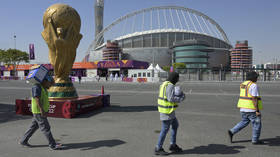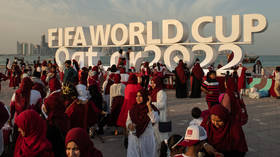
No diplomatic boycotts are being staged despite Qatar’s harsh LGBTQ laws and alleged worker abuses. Compare and contrast this with the West’s treatment of China
By Timur Fomenko, a political analyst

Workers walk past the Khalifa International Stadium in Doha on November 16, 2022, ahead of the Qatar 2022 World Cup football tournament. © Juan MABROMATA / AFP
The FIFA World Cup in Qatar is approaching. The event is controversial for many reasons, not least because of a backlash from Western sports teams over the question of human rights in the Arab country.
Qatar is an extremely conservative religious society. It has harsh laws pertaining to LGBTQ people, but even besides that, the decision to host the tournament in a country so small, so hot and lacking in any football tradition, has always been controversial, with FIFA being accused of corruption.
These bizarre circumstances have led the country to scramble to build a football infrastructure in a short space of time, which has also seen them get accused of using forced labor to build its World Cup stadiums. Some sources say as many as 6,500 workers have died in Qatar since it won the right to host the World Cup, and it is assumed many of them were working on the facilities’ construction.

Read more
So, is it any wonder Western audiences are disapproving of it? But one should note the vocal disapproval comes from the grassroots and the teams themselves, not from governments. The same Western governments who staged diplomatic boycotts of the 2022 Winter Olympics in Beijing don’t seem to have a problem with Qatar. The public wants a boycott, but politicians do not.
Where is all the posturing over the issue from leading British MPs, Such as Iain Duncan Smith? Or senior US political figures, such as Nancy Pelosi? The same people who cried foul over “genocide” in China’s Xinjiang autonomous region and demanded a boycott don’t seem to care about Qatar.
It’s as if their principles aren’t consistently applied, or perhaps more to the point, as if these people never truly cared about human rights in the first place. For them, it has always been a political game, and their indifference over a much more controversial event in Qatar shines through. But why?
The wealthy Arab nation of Qatar is a strategic partner of the West and a massive exporter of natural gas. Western countries have been scrambling to secure new deals with the state amidst the conflict in Ukraine as an alternative to Russia.
Independent from the British Empire since 1971, Qatar’s massive prosperity is a product of long-term clientelism by the West, which sees it as a critical partner to containing Iran. The tiny Qatar subsequently props up Western strategic interests throughout the Middle East, serving a similar purpose in Saudi Arabia, Kuwait, Bahrain, the United Arab Emirates, and Oman. They sell the West energy, the West sells them arms, which are then used to enforce the West’s vision for the region.
All of this means that Qatar gets a free pass on human rights. In the eyes of Western governments, it is fine for Qatar to have a very zealous interpretation of Islamic law, abuse migrant workers and hate gay people, because they’re a partner.

Read more
But the same criteria do not apply to China. While Qatar is a partner, China is seen as the biggest challenger to the US-led political order, a geopolitical rival. As a result, ‘human rights’ are weaponized against China and the Olympic boycotts were staged with the goal of humiliating Beijing and denying it any political glory from the event.
It’s also worth noting that anger against China was generated ‘top down’ by governments seeking to manufacture consent for a boycott, while anger against Qatar is ‘bottom up’, coming from individuals and sports figures, but ignored by their respective governments.
There will be no sanctions or penalties against Doha. Likewise, the US government does not fund or target any groups who are dissenting against the Qatari government, nor does it have an army of think-tankers and other ‘experts’ dedicated to producing ‘studies’ against the country and lobbying against it on social media all day either. Why does the US not ban all Qatari products claimed to be “made with forced labour” like it did to Xinjiang?
This only goes to show, in real time, how the human rights ‘industry’ is used and coordinated in line with geopolitical agendas. Those who criticize Qatar find themselves alone, with no resources and no media campaign manufacturing outrage. Therefore, the biggest takeaway from this is thus that ‘human rights’ are just a game, tool and weapon used by Western countries to vindicate and legitimize the imposition of their will on other countries. The standards that the West professes to uphold are in fact applied inconsistently, opportunistically and selectively. Otherwise, they are perfectly happy to be silent. Qatar good, China bad.
The statements, views and opinions expressed in this column are solely those of the author and do not necessarily represent those of RT.




